PROMPT S5.2 IS — AI security patrol robots
The Prompt Patrol Robot allows performing intelligent video surveillance at medium distances while in motion. The Prompt is designed to patrol continuously, and this permits efficiently keeping control over premises of any size. Using the Patrol Robot is the best solution to guard areas where there are a lot of buildings, fences, or other obstacles that do not allow performing video surveillance from positions located far away. The highest level of effectiveness is achieved by using several robots in one general area that is under guard. Smart patrolling of the premises accomplished by several robots allows using several different cruise routes, making it difficult for an intruder to predict when the robots will appear.
Video surveillance camerasSix HD panoramic cameras 1280х720 0.005lux
The distance of detection at dayHuman 25m
face – 2m
Temperature range-25°C … +55°C
RF communication3/4G, WLAN
Speed, range 4 – 6 km/h, 24 km
Weight with battery. Charger181kg, 48VDC 600W
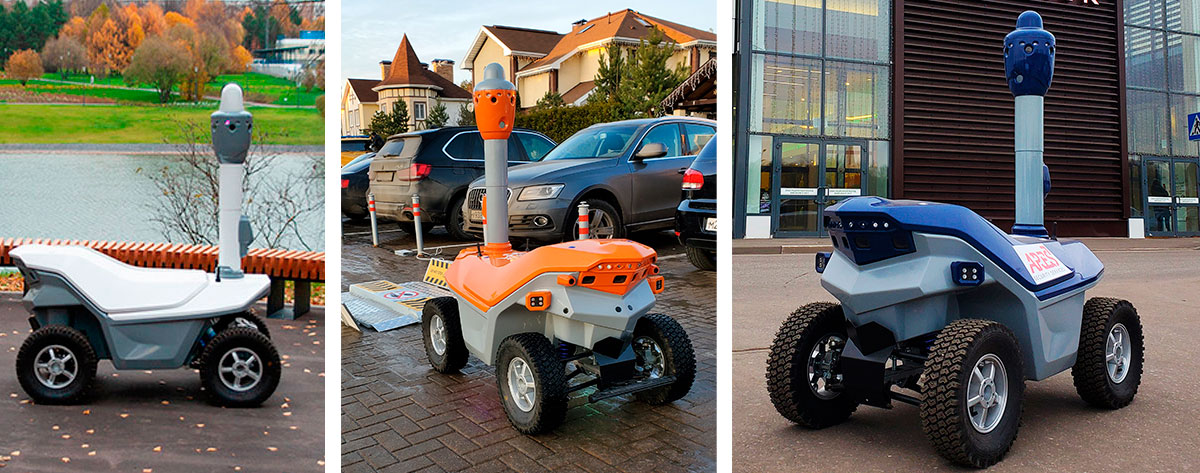
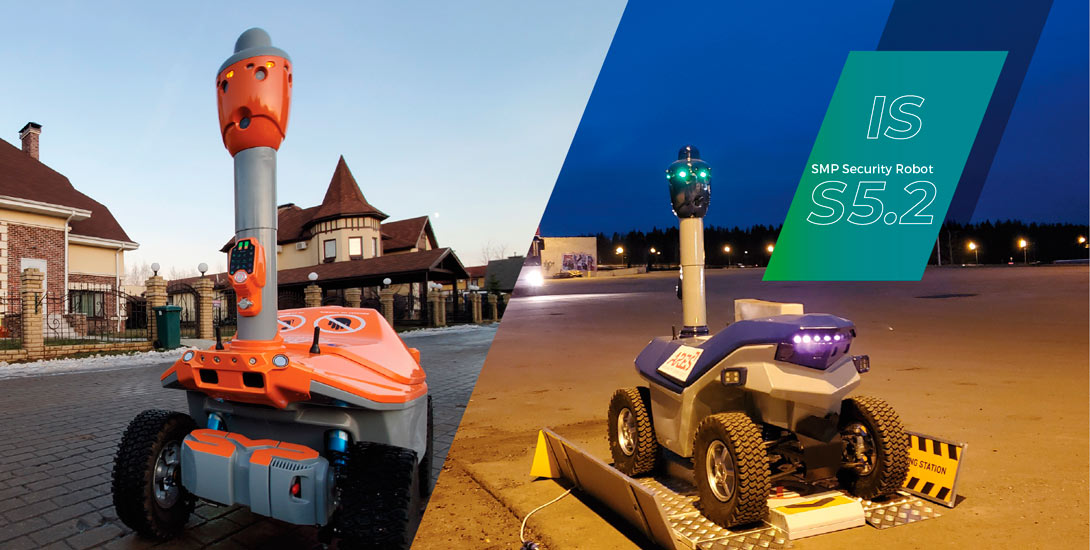
All S5.2 Prompt patrol robot’s applications
- Patrolling along sidewalks
- Gated communities
- Apartments
- Resorts
- Government and office buildings
Key features
- Continuous smart patrolling
- Detecting people within a 30-meter radius
- Facial recognition up to 3 meters
- Photo and video recording of people and their faces
- Demonstration of a presence
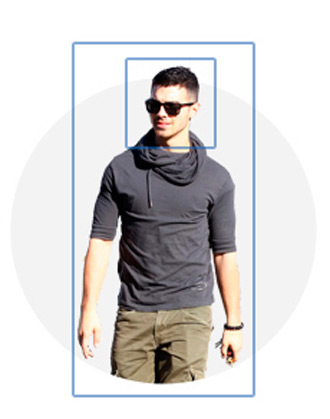
Facial recognition during law enforcement patrolling
The Prompt is ideally suited to patrol both streets and walkways. An intellectual video surveillance system with AI permits detecting human faces located in the robot’s immediate vicinity in any direction. The fact that the robot and people are located on the same pedestrian passageway shortens the distance between them, and allows taking photographs of their faces that have a sufficiently high resolution to enable subsequent facial recognition.
Using the robot for public safety enables accumulating information for Big Data analysis. Owing to the robot’s movement, the places where information is collected can be swiftly changed depending upon the day of the week, the time of day, or the times for exhibitions or public, athletic, and cultural events. The Prompt Patrol Robot is indispensable for guarding the perimeter of unmanned areas. Thanks to the AI-controlled video surveillance system, the robot is able to detect a person in erratic illumination typical for outdoor surveillance. The Prompt robot is able to reliably detect a person located within a radius of 20-25 meters. For uninhabited areas, or facilities where people are not supposed to be at certain times, discovering a person means an alarm situation that the robot can inform the CMS dispatcher about.
Patrol robot with artificial intelligence (AI)
The artificial intelligence patrol robot is capable of independently putting up resistance to an intrusion, or thwarting various threats. To do this, the robot is equipped with a voice notification system with synthesized voice warnings that depend on the type of threat recognized. The unique properties of the artificial intelligence are most apparent when robots are working in a group. By processing Big Data accumulated by the robots while guarding a unique facility, this mode allows predicting the places where the threat of an intruder will most likely arise. Distributed control of the patrol routes using AI control for each of the robots allows forming a highly efficient mobile group of security robots that can prevent external threats.

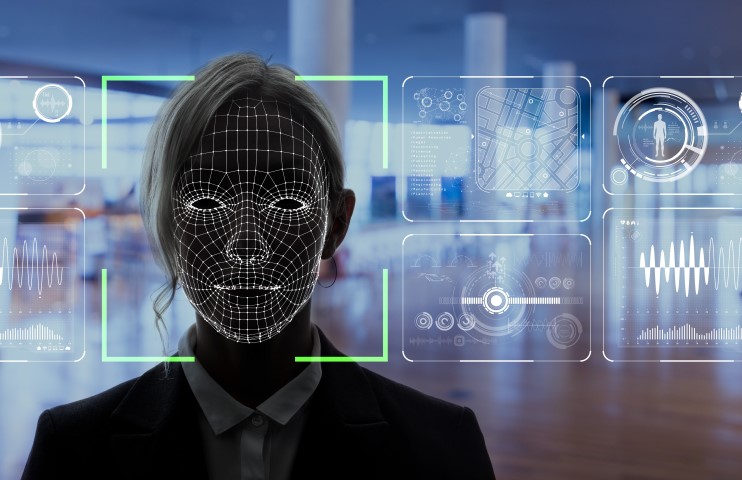
Human identification to control access for personnel and security officers
The embedded facial recognition system allows controlling the work performed by security officers. To do this, it is mandatory that security officers at a patrolled facility approach a robot no less frequently than a certain assigned time interval. Upon approaching the robot up close, the recognition system recognizes the security officer’s face, and informs the officer about it. Along with that, any robot on the patrol route will receive information on where the security officers are located and, thanks to artificial intelligence, will adjust its patrol route. The next time that the security officers meet any of the robots, the time interval between incidences of recognition is calculated, and the work performed by the security officers is evaluated.
A demonstration of robotic law enforcement activity to prevent threats
Patrol Robots continuously moving around the premises using beacon signal lights are able to project their presence across the area under guard. By doing this, they prevent unlawful activity and thwart intrusions into restricted-access areas.


The Prompt Patrol Robot is capable of effectively functioning as a part of a group of robots by using the advantages it has during mobile patrolling. In addition, this robot model provides the ability to rebroadcast data from other robots under complicated radio conditions thanks to MESH WIFI. To increase the autonomous operation time of a robot, it is supplied without computers for video analytics. This model is called S5.2 IP Djet.
Additional robots exist for reliable robotic patrolling over large premises, or around complex facilities. The S5.2 PTZ IS Picard video surveillance robot is ideal to move between open positions that are convenient for long-distance video surveillance. In conditions where the premises are not illuminated, or especially critical applications are involved, the best solution would be to use a security robot equipped with an S5.2 IR Argus thermal imaging camera.
Hardware for developing specific (untypical) applications
PROMT development kit
Development of intelligent video analytics systems for the S5.2 PROMT robot.
- T9 embedded computer +
- 360-degree view 6 camera systems
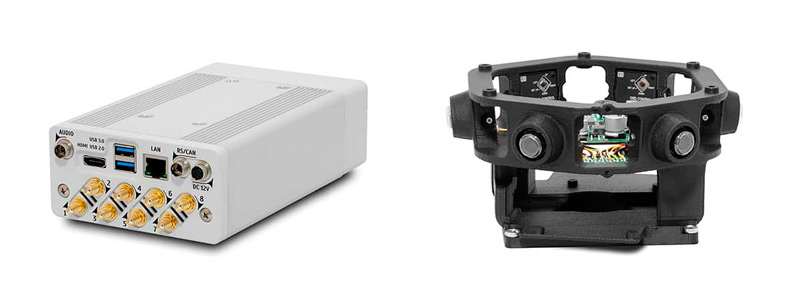
Technical specifications of patrol robots PROMT
| Characteristics | Parameters |
|---|---|
| Models | Promt S5.2 IS |
| Quantity of panoramic cameras | 6 |
| Resolution and sensitivity of panoramic cameras | 1280×720, 1.3MP; 0.005 lx |
| PTZ camera optical zoom / resolution | none |
| Sensitivity of PTZ camera | none |
| Cameras for object detection | panoramic |
| Human detecting range at day, up to | by panoramic cameras 25 m (82 ft) |
| Face recognition range at day, up to | by panoramic cameras 2m (6 ft) |
| Embedded computer for video analysis | 1pcs T9 |
| Records | constantly or human detection |
| Bitrate and storage size per channel | 2048Kb/s or 4096 Kb/s, 0.9GB or 1.8 GB |
| Embedded SSD T9 | 120GB |
| Wi-Fi MESH and Ad Hock antennas | 8dBi |
| Estimated operating time | 12 hours |
| Charging time | 4 – 6 hours |
